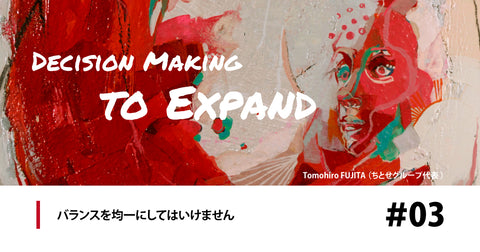
I went to India for about 6 days last week. For Fujita, who wrote in Part 2 that he is always conscious of the balance between organization and chaos, India was a much more interesting country than he had imagined. In general, the country is not as biased toward chaos as the Japanese imagine, and in fact, Indians are the ones who continue to think much more deeply about the balance between order and chaos than the Japanese. However, although I only stayed for 6 days, I understood it well.
In contrast to Indians, I feel that many Japanese people today believe that the correct answer is to reduce chaos as much as possible and continue to organize things to the fullest. Isn't it important for people with such values to have a balance between organization and chaos? Whenever I make such an opinion, I get scolded and dismissed, saying things like, ``You're naive,'' or ``Go get an MBA.'' No matter how old you are, organizing is the only right thing to do. I know that if I say to people in the church, ``Isn't balance important?'' they'll only get angry at me, but I can't fix the fact that I still say things like that (lol)
Even though I say that a balance between organization and chaos is important, I do not believe that it is correct to create an even balance in all parts of an organization. Nearly 20 years ago, when I was working as a consultant, I was involved in setting goals and creating personnel evaluation indicators for power plants, and I learned that chaos should not be introduced into power plants. In the case of work such as at a power plant, it would be dangerous to work in an organization that eliminates individual will and judgment as much as possible and performs all tasks according to well-written manuals. (However, if an organization created with such values is forced to confront an event that was completely unforeseen when the manual was created...)
Power plants are an extreme example in the world, but in organizations that perform operations that have established methods to some extent, it is important to manualize operations as much as possible and create an organizational structure that allows anyone to provide the same quality. In other words, "organizing" will lead to "expanding" your business. It goes without saying that a major reason why McDonald's and Starbucks ruled the world was because they were extremely good at organizing their operations into manuals that could be handled by many people around the world. Also, by creating a manual and organizing it, the probability of ensuring the safety of employees and customers increases. As a major premise for making money, protecting the safety of customers' employees is the most important thing for company management, and for that reason, organizing your business is more important than anything else. (However, a well-organized organization also tends to be slow to respond when something completely unexpected occurs.)
This has been discussed extensively, but there are many examples of companies that are successful in Japan today that have reorganized operations that were created in Europe and the United States and have established a certain level of practice, using a Japanese sense, and spread them around the world. There are so many that I don't have time for them. In addition, there are many companies that managed to reorganize their businesses to recover from the overly aggressive management practices of the bubble period, resulting in high profits and are still safely at the center of the Japanese economy. In either case, many of the people currently at the top of their respective companies are in their positions because of their ability to organize their work well. I feel that this is one of the major reasons why the balance between organization and chaos is more heavily skewed toward organization than in other countries.
I would like to clarify that Fujita does not mean to say that it is bad that large Japanese companies are excessively leaning toward the liquidation side. I don't think organizing is a bad thing in the first place. In fact, as the company Chitose grows, the number of operations and departments that need to be further organized is increasing, both for our further growth and for the safety of our customers and employees.
A personal confession: I find it easier to organize things, and I like it. However, since I have chosen the role of CEO of a startup in my life, I am working hard every day to increase the proportion of chaotic people in my organization, so I myself am a person who wants to cause chaos. I feel like people think I'm a person who likes chaos, but that's definitely not the case. To begin with, I am a person who says that I like living in Singapore.
I just think that compared to other countries, Japan has become a society and culture where many people do not doubt that the only progress in work and society is to bring everything in the world to the side of organizing. Why is it there? I just want to discuss the issue. One of the reasons for this is that most of the people who hold real power in Japan's economic world today are people who have been praised for their ability to ``skillfully organize chaotic situations.'' This is probably an out-of-focus point. I don't think so.
When running a small company like Chitose, we believe that building a team is a large part of the work that managers do. This is also the reason why there is no "Human Resources Department" yet (although I think there will be a Human Resources Department soon). The balance between organization and chaos that each of the countless teams within a company should have differs depending on the type of work each team is facing. I believe that it is the manager's role to adjust the balance between organization and chaos in each team based on the preferences, intentions, and thinking of the people assigned to the team.
The work that requires creating the most chaotic team at Chitose is a team that conducts research and development and business development that no one in the world has attempted before. When creating a team to tackle such a mission, it goes without saying that a team made up of complete amateurs in the field will not work, but that doesn't mean it won't work well if the team is made up of only experts in the field. I don `t go.
When I explained that ``The key to R&D and business development is to maintain a balance between organizational chaos and the balance of human resources within a team,'' people at business companies often responded, ``I see, that's interesting.'' or `` I often hear people say things like, "I've thought that way for a while, but having it put into words makes me feel refreshed." On the other hand, people who are engaged in a business such as consulting, where they support businesses from outside, and who have achieved financial success in that line of work, say, ``The deeper the expertise, the better.'' The higher the ratio, the better.'' In response to Fujita's opinion, ``It is important to strike a balance between organization and chaos by balancing amateurs and experts.'' I often get nagged, saying, ``You're naive,'' or ``Go get an MBA.''
Every time Fujita, who is full of curiosity, sees opinions so clearly divided based on someone's career path, he can't help but get excited and listen to the serious sermon with a grin on his face, which makes him even more angry. (laughs)
A concrete example of why this "balance between amateurs and experts" is important when starting a new business can be seen in an article written by Kataoka, who has traveled across Africa by bicycle ( Chitose's Please read Hito Vol.6 Yosuke Kataoka ~Living in Evolution~ ).
Although I myself have never traveled more than 50km on a bicycle, I find Kataoka's story of riding across Africa on a bicycle so interesting that I have listened to it over and over again, so I sometimes tell people in interviews that he rode a motorcycle across Japan, or that he rode a bicycle from Kyushu to Tokyo. I feel sorry that the reactions I received from young people who were so enthusiastic about their travels were so weak.
written by: Tomohiro FUJITA
◾️ Click here for a list of past articles by founder Fujita




